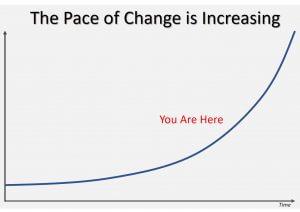 Digital Sustainable Millennial Social Agile Mobile Global Networked Big Data Artificial Intelligence Gig Lean…et al.
Digital Sustainable Millennial Social Agile Mobile Global Networked Big Data Artificial Intelligence Gig Lean…et al.
Discussing the “The Pace of Change is Increasing” slide among management consultants, the common view is that today’s managers have more change drivers coming at them and with greater pace than any recent generation of leadership.
It’s an exciting time, with new opportunities appearing weekly. However, the surge creates new demands, too. Today’s managers cannot be an expert in all these change drivers, but neither can they be a master-of-none generalist. Some are handling the conflagration while others are being swept aside. Strategy revision in the morning, process improvement during lunch, joint-venture in the afternoon, product innovation over dinner, policy revision before supper. Jedi-knight is a fitting aspiration.
 Managers identify new needs triggered by these change drivers then assemble groups of colleagues to address them. They are invited by superiors and colleagues to participate in other groups addressing further organizational needs. Today’s managers spend 50% to 95% of their time in ‘collaborative actions,’ aka, strategy meetings, initiatives, programs, problem-solving workshops. The outcomes drive the manager’s success while their sum value determines the organization’s success.
Managers identify new needs triggered by these change drivers then assemble groups of colleagues to address them. They are invited by superiors and colleagues to participate in other groups addressing further organizational needs. Today’s managers spend 50% to 95% of their time in ‘collaborative actions,’ aka, strategy meetings, initiatives, programs, problem-solving workshops. The outcomes drive the manager’s success while their sum value determines the organization’s success.
Unfortunately, while the manager’s collaborative leadership skills might grow through these experiences, few are formally trained how to take the identification of a new need through goal-setting and planning to sustained positive impact.
MBA courses do not teach it, nor does the school of hard knocks. Involvement in ten collaborative actions isn’t a qualification. Despite what we’d like to think, experience alone rarely leads to excellence. If someone calls themselves an architect but was never trained in Pythagoras, their blueprints are only ever going to be so good.
 There is a set of people that know Pythagoras for collaborative actions. Their specialism is turning need into impact regardless of the industry, domain, or subject. They are management consultants who go into different organizations and different situations, often alone or with a small team.
There is a set of people that know Pythagoras for collaborative actions. Their specialism is turning need into impact regardless of the industry, domain, or subject. They are management consultants who go into different organizations and different situations, often alone or with a small team.
Where the client sees each collaborative action as a unique snowflake, these management consultants recognize that they all have a diameter, a weight, a center of gravity, a density, a shade, and a path – and know how to use the attributes to rapidly turn water vapor and dust particles into snowmen.
They don’t just see a post-merger integration between two regional banks or a digital strategy for a market-leading professional services firm, for example. They see a group of people with a shared topic. That topic is either New, Immature, or Tenured. They know which one of the seven Types of collaboration it is, and the 12 to 28 Themes it comprises. They see that it’s either Within, Between, or Across organizations and determine whether it has a Centralized, Biased, or Distributed power model. The collaborative action’s nature is Generative, Diagnostic, or Restorative. The clients don’t just have opinions, but Four Categories of Opinion that will drive the goals. These management consultants will decide to collect quantitive data, at one, two, or all three of the times it might be needed. They don’t aim for lowest-common-denominator consensus but surface the client’s most valuable and viable goals.
 Unfortunately, the business manager only meets this type of management consultant professionally when one is hired to perform a project at the manager’s company. Even then, as one CEO described it, “The management consultant walks in with their black box of frames, methods, and skills, we follow them around and react to their needs, follow their process, then they walk out again, taking their know-how with them. However, for the one time where we can afford to hire a great management consultant, there are twenty situations where we cannot, but I’d like us to apply that class of thinking.”
Unfortunately, the business manager only meets this type of management consultant professionally when one is hired to perform a project at the manager’s company. Even then, as one CEO described it, “The management consultant walks in with their black box of frames, methods, and skills, we follow them around and react to their needs, follow their process, then they walk out again, taking their know-how with them. However, for the one time where we can afford to hire a great management consultant, there are twenty situations where we cannot, but I’d like us to apply that class of thinking.”
Well, that is now happening. For example, Susan, the CEO of a financial services firm, an MBA, chair of an industry alliance, and board member of a national policy group, is learning the Advanced Management Consulting Core Skills.
She dropped me a one-line email last week: “We came up against a problem in the industry alliance today – and I knew why because of the course. It does work!!!” The exclamation points are there because when Susan learned the first framework, it “…was not like any other frame or model I had ever seen in business.” At the time that was frustrating for her, but it’s turned out to be a good thing.
 Are you a business manager who wants to augment your current skills and knowledge with the ability to identify new needs and take them through to sustained positive impact? If so, the contemporary, objective, outside-in management consulting frames and methods to do so are now available to you as professional education.
Are you a business manager who wants to augment your current skills and knowledge with the ability to identify new needs and take them through to sustained positive impact? If so, the contemporary, objective, outside-in management consulting frames and methods to do so are now available to you as professional education.
If you are a management consultant with deep domain expertise and incomparable specialist skills but without professional training how to conduct a complete client project from need to outcomes, you can now acquire it. Not just what to do; how to do it.
Sy Syms of Syms Clothing is credited with coining the company’s slogan, “An Educated Consumer is our Best Customer.” in the 1980’s. It has been echoed from industry to industry in the decades since. The business managers learning Advanced Management Consulting core skills express this as:
With the pace of change increasing and the volume of change drivers at play, our organizations need the most capable leaders, and management consultants need educated customers. It’s a win-win for all involved.
Nice piece
It is really important to have essential skills to lead a business. This blog is really informative in every aspect. I have shared this blog with my team and staff. This article contains the exact amount of skills anyone wants. I would love to read more such articles.
To have a professional management consulting skills one needs to very professional, he/she must have the capacity to lead, they must have a collaborative nature, they should posses a high skill, etc.